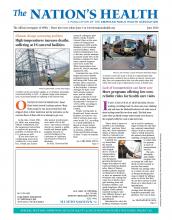In my over 20 years in public health, I’ve watched the field progress from a focus on disparities to a more upstream approach in creating health equity. More recently, there has been increasing recognition to ensuring that accessibility and belonging are a part of diversity, equity and inclusion work. However, even with this intentionality, there is a population that often remains overlooked —people with intellectual or developmental disabilities.
As many as 8 million people in the U.S. are estimated to have an IDD, such as Down syndrome, cerebral palsy or autism. Many people with IDD have health issues that are exacerbated by poor quality health care, a health system that is not designed to meet their needs, and a host of challenges related to housing, transportation, education and employment. As a result, this population experiences significant health disparities that are worse for those who are at the intersections of multiple identities, including race, ethnicity, gender and sexual orientation.
Unfortunately, most health care and public health professionals are not trained on the unique presentations and considerations of people with IDD. As a result of a lack of exposure, misconceptions exist that influence how people with IDD are treated.
After being awarded a grant from the Special Olympics, my colleagues and I in the APHA Center for Public Health Policy set out to learn more about the lived experiences of people with IDD, their caregivers, family members and advocates. Through a series of listening sessions, we heard repeatedly that people with IDD are infantilized and ignored by their providers. Many described encounters where their doctors only spoke directly to their caregiver or support person, and not to them. We also learned that there are many legal and policy barriers to ensuring equity for people with IDD.
As a Black woman who has worked in the health disparities and equity spaces for decades, what struck me are the similarities in the challenges experienced by people with IDD and other marginalized groups: lack of access to quality health care, not being listened to by doctors, health communications that are hard to understand and fragmented services and systems. At the same time, people with IDD also have a strong desire to be seen, heard and valued for their full selves and their many identities.
“As public health professionals, we have the responsibility to center the needs and priorities of people with IDD in our work.”
— Tia Williams
As public health professionals, we have the responsibility to center the needs and priorities of people with IDD in our work. While there are nuances and considerations that are unique to the type of IDD, much of the learning and unlearning that the public health community has embraced through the lens of diversity, equity, inclusion, access and belonging can be extended to advancing health equity for people with IDD. We must honor and listen to the lived experiences of people with IDD and meaningfully engage the community in advocacy, program and policy efforts.
We also must acknowledge and learn from the many organizations that have been creating opportunities for people with IDD for decades. And we have to ensure that our commitment to equity and social justice extends to improving the health and well-being of people with IDD.
Williams, MPH, CNS, is director of APHA’s Centers for Public Health Policy.
- Copyright The Nation’s Health, American Public Health Association









